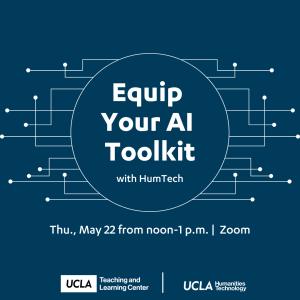
By Jordan Galczynski on May 9, 2025
Humanities Technology announces the release of the AI Toolkit for the Humanities Classroom, a set of resources and materials developed by the Instructional Technology Manager and the RITCs (graduate student Research and Instructional Consultants) to support UCLA’s OpenAI initiative. The Toolkit aims to reduce the anxiety caused by AI for many instructors in the Humanities division by developing clear and targeted materials on a variety of topics.
The RITC’s have been working hard to generate materials from suggestions for language to include in your syllabus regarding the ethical use of generative AI as well as how to use AI to create templates for syllabi or to revise old syllabi— taking a 10-week course to a summer session, for example. Generative AI is also helpful in generating draft rubrics that can then be revised by an instructor. Other topics covered address ethical concerns like data privacy and consent, inherent bias, false information, and hallucinations by generative AI, as well as a focused study on the environmental impacts of AI.
Amid the numerous concerns surrounding AI, it’s important to recognize its many positive aspects as well. There are many potential uses of AI in the language classroom, best exemplified by our tutorial on how to practice conversational skills with a custom AI chatbot (Want to make other custom GPTs– see our step-by-step guide). Another effective use of AI concerns accessibility— AI is great at writing alt-text or checking your language in assignments or tests.
Within the classroom, when students are allowed or expected to use generative AI in a course, how to cite the various tools becomes necessary, as well as how to evaluate AI-generated student work on the instructional assessment side of things. Others might be interested in learning more about AI-content detectors, which as we note in the article, are unreliable, with many false- positives. We recommend reframing assignments to be AI-proof, which will be addressed in our next round of posts. Lastly, we are exploring how generative AI is helpful in the research process. There are a plethora of tools to aid in literature reviews, like Scite and Julius. We will be tackling AI and research more thoroughly in the coming academic year.
There will be two events to showcase our Toolkit— TLC’s 10+10 Pop Up Series on May 13th at 10 am and “Equip your AI Toolkit” on May 22nd at noon. Please consider attending to learn more!

We invite everyone to take a moment to look through our materials– AI Toolkit for the Humanities Classroom. We would love suggestions and feedback. Email Dr. Jordan Galczynski (jordan@humnet.ucla.edu) with any ideas or topics you would like to see addressed.
